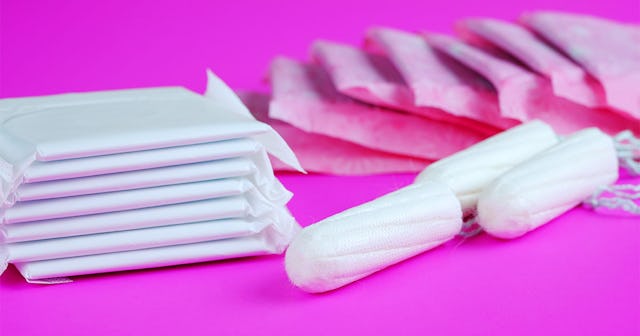California Could Soon Require Free Menstrual Products In Public Schools

California Democratic Assemblywoman Christina Garcia was inspired when Scotland declared last year that access to menstrual products is a human right. The country announced it would offer free period products to whoever needed them. The Period Products Bill was passed unanimously by Parliament and requires schools, universities, and publicly funded places to offer free menstrual products in all bathrooms. Garcia decided to put into motion an addition to her 2017 bill that made it law for low-income schools to provide free menstrual products to students who need them. And now California may be on its way to offering the same grace to all public schools.
California is set to remain free of the what is known as the “tampon tax” until 2023, but starting during the 2022-2023 school year, all grades 6-12, the California State University, the University of California systems, and community colleges in the state will offer free menstrual products to all students. There currently isn’t a registered opponent to this law. Five other states have passed laws that provide students free period products: Virginia, New Hampshire, Illinois, New York, and Oregon. This needs to be standard in every state because menstruating is expensive, unpredictable, time consuming, and life changing.
According to Period Equity, 27 states still tax menstrual products—the tampon tax—because they are seen as “luxury” items. Not bleeding all over myself should not considered a “luxury.” And if we’re going to tax a product that allows people to go to work and school a “luxury” then we should also be taxing other health care items like erectile dysfunction medication. The ability to get a boner is a bummer but it doesn’t stop one from earning a living and being able to show up to take care of basic needs. Garcia pointed this out while reminding folks that (cisgender) women spend $20 million a year on menstrual products.
A menstruater will spend roughly 2,535 days of their life bleeding and one’s financial ability will determine how they deal with what they have little to no control over. When you are already living in financial insecurity, the cost of menstrual products is often too much to afford as is the stigma around periods. This is called period poverty and 500 million people experience it around the world. Period poverty is not just a third-world problem; a study published in Obstetrics & Gynecology in 2019 found two-thirds of respondents, low-income assigned female at birth women in St. Louis, MO, had not been able to afford period products at least one time in the last year; 20% dealt with this on a monthly basis. Thinx, a period underwear company, discovered that one out of five teens have struggled to afford or have not been able to buy menstrual products.
ShotShare/Getty
The website Free The Tampon offers eye-opening, but not surprising to those of us who bleed, statistics on the additional anxiety and emotional cost of not having access to menstrual products in public spaces. 86% people said they started their period unexpectedly and didn’t have anything with them, which caused 79% of people to say they have “macgyvered” a tampon or pad out of toilet paper. OMG. I have been in both situations and the stress of those memories still makes my skin hot with frustration and embarrassment.
According to Free The Tampon, 53% asked another menstruator for supplies while another 32% went home immediately to get supplies. If toilet paper and soap are offered for free in bathrooms, then period products need to be available too.
Imagine taking a shit and realizing you didn’t have anything to wipe yourself with. If this happened in a public bathroom, would you use your underwear? Would you waddle out with a dirty anus and grab paper towels if they were available? If not, would you ask someone for a tissue or napkin? What if you couldn’t go home? How long would you have to look for something to use to clean up? Would you be able to stay focused if you were forced to stay at work or school? The upside is that you likely won’t have to poop again too soon; but if a person is stuck without something to catch the flow of blood, the the fear and discomfort of bleeding on yourself and onto clothing makes it impossible to think about anything else.
This is why I would rather take be surprised by a loose bowel movement in a paperless stall than be caught without a menstrual product on a heavy day.
While many people mistakenly consider this to be a “women’s” issue, it’s not. It’s a person who menstruates issue. Products need to be available to all genders who menstruate and in spaces where all genders go to the bathroom. This not only reduces the stigma around people bleeding, but around the fact that nonbinary people and transgender men menstruate as well.
Congratulations to California and the people who will benefit from Garcia’s persistence to make menstrual products accessible to everyone and not a “luxury” item for some. Now it’s time for all of the United States to do the same.
This article was originally published on